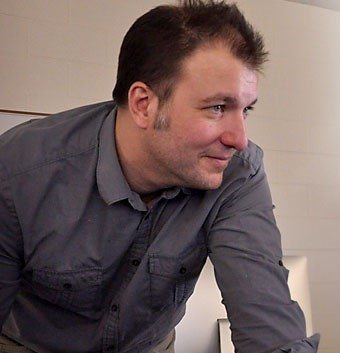Jeff Vande Zande teaches fiction writing and screenwriting at Delta College. His books of fiction include Emergency Stopping and Other Stories, Into the Desperate Country, Landscape with Fragmented Figures and Threatened Species and Other Stories (Whistling Shade Press). His novel American Poet won the Stuart and Vernice Gross Award for Excellence in Writing by a Michigan Author and a Michigan Notable Book Award from the Library of Michigan.
For more information, contact Jeff Vande Zande (jcvandez@delta.edu)
Nicola: Hi Jeff, Good morning
So the first thing I wanted to ask you is what’s your own experience of addiction?
Jeff: My own experience? Well, as far as I know, I’m not addicted. There’s alcoholism in my family pretty rampant, so I’ve tried to keep an eye on that in myself. In stressful times, I’ll get into a nightly habit with Jameson, but then I can go weeks where I don’t even think about it … still, it’s something that’s always there. I’m not without the experience of witness … alcohol strained and even destroyed relationships in the adults in my family.
Nicola: I saw that you dedicated the book to your mom and that she was an addiction therapist. Would you have learned a lot from her, because of her profession, about addiction?
Jeff: She didn’t talk a lot about work. When I lived near her, we were in Marquette, MI … very long winters, so drinking is pretty prevalent in that town. I know there were people that I knew that had to go see her (court ordered). I used to play in a bar band, and I remember this one guy came up to me sloppy drunk with a beer, toasted me, and said, “Tell your mom I said hello.” Clearly he was one of her clients… a little bitter, I guess
Nicola: Wow! that’s intense.
Jeff: She was good at what she did … she was no nonsense and straightforward, and I think sometimes people get bitter and angry when faced with their own truths.
Nicola: I agree. So is there real life inspiration behind Robby and Tiff and the other characters in the book?
Jeff: It’s always weird to try to remember the impetus for a book. I started Detroit Muscle five years ago during the tail end of my marriage. Then I took a hiatus and only started trying to work it into a complete shape when I was separated and living in an apartment by myself. For me, Robby and his addiction is a metaphor … I can explain if you wish.
Nicola: Yes please do!
Jeff: Well, I was really trying to say something about Michigan. Not sure how familiar you are with Michigan, but it’s a banana republic of sorts, with the auto industry being our banana. I think Michigan was addicted to the auto industry. Now, with the auto industry not nearly as prevalent in the economy, Michigan is kind of in a rehab… trying to find its way. So, Robby represents a young Michigan trying to find its place. For me, the grandpa represents old Michigan … it’s no coincidence that I named him Otto. Of course, I knew I also had to represent OxyContin addiction well, too … because Robby couldn’t just be a metaphor … he had to be a real person, too.
Nicola: That’s really interesting and quite fascinating how you entwined the two.
Jeff: Did you have a chance to read some of the book?
Nicola: Yes I did. And really enjoyed it. It is a deeply emotional portrayal of addiction – How does constant deep involvement with these characters affect you personally?
Jeff: I haven’t been involved with the characters on that level in awhile. For the last year, it’s been more about working the manuscript into shape…more on the sentence-level than the emotional level. While going through my divorce, however, getting in touch with these characters was important to me… they were lost, I was lost … so watching them find their way helped me find my way. If that makes sense. Plus writing them finding their purpose was a way for me to find my purpose again as a writer.
Nicola: That’s incredible. I love to learn about other writers writing process.
Jeff: I teach screenwriting, too… and that style got into this book… I want it to read a bit like a screenplay … very sparse prose… that style helped me get around something that I wasn’t sure I could write… I can explain.
Nicola: And it worked brilliantly. It was so descriptive that I was right in there, in every sentence. It’s definitely “I can’t put it down” type of book.
Jeff: In a screenplay…you never get into the character’s heads. What they are thinking has to come out in what they are doing or saying. I knew I couldn’t really get into Robby’s head because I don’t have the experience with addiction to really represent what someone might be thinking… so I worked to show his struggle through his words and actions. That’s why I had the scene with the therapist … I could get at Robby’s past because he was forced to talk about it…
Nicola: Wow. That is very enlightening.
And research – did you have to do much of that? I was interested in the part where you talked about smoking – when the therapist said that because Robby wasn’t addicted to smoking it was perhaps a sign that he wasn’t a natural addict.
Jeff: That I kinda made up… but it sounds believable. My friend is a social worker and has worked with addicts, and I had him read the therapist scene closely to see if it was authentic…The therapist is based on him.
Nicola: Ah I see! I was never a smoker either and in my addict brain I was thinking “Oh! Maybe I’m not an addict after all.” Oh Well. But yes it’s very believable!
Jeff: I think there’s some truth to it. If not teaching, I likely would have gone into counseling. My friend says I have some decent insights into human behavior which you have to as a writer…
Nicola: Yes I agree.
So what do you think this book can offer the recovering community and their families?
Jeff: I really think that it’s a story of hope and redemption. Robby struggles but is also resilient in the face of his addiction… I think it ends on a very positive note.
Do you think it has anything to offer them?
Nicola: Yes I do. I think to the wider public it gives the addict a human persona. We too often treat addicts as inhuman and uncaring. It also highlights the devastation caused in our active addiction that we are not really aware we caused, and it gives hope that recovery is possible. We hear a lot also about the active addict in the public arena but not much about the fantastic recovery stories out there.
Jeff: You are one of the first strangers that has read the book and I’ve had a chance to talk with…so it pleases me that you enjoyed it and find in it the things I thought were there to be found…if that makes sense.
Nicola: Yes it makes sense.
Jeff: Over time, it became less about making Robby a metaphor and more about making him a real character. I think people could read the book and miss the whole auto industry thing… which is good… don’t want my metaphors to be too heavy-handed.
Nicola: I guess it depends on who’s reading it. Because I’m in recovery it was so relateable on a personal level.
Do you have a favorite part of the book?
Jeff: Writing the book surprised me at times. I didn’t know I would feel so much for Uncle Jack, I didn’t know that I would include fly fishing. But for me the scene that I’m proud of and happy with is the party scene. I mean, I’m 45, so I haven’t been to a party like that in a long time. I think I represent a young person’s party well. I remember a few years ago sharing that scene with students. They liked it, but said that I had to get cell phones in there because everyone is on their cell phones now during a party … so I did that.
I do like the ending, too. The ending plays off the beginning…
In the opening, he looks at Detroit from an airplane and it makes these sweeping generalizations about decay and loss… at the end, he’s on the streets of Detroit, and you see the hope mixed in with the decay…even Andre, the villainous seeming loan shark … even he has a softer side.
Nicola: Yes. I did pick up on that. Awesome.
Jeff: I think that gets at the fact that any addiction story is not a black and white story… it’s complicated.
Nicola: Absolutely.
Jeff: Did you have a favorite scene?
Nicola: Actually I did. And it was at the very start when he was talking to Tiff about the baby. And something she said really struck me hard;
She said something like – “We are not part of your recovery, We’re not going to be the thing that makes you feel good about yourself – or sorry for yourself – I can’t remember which – but it was like damn that is exactly what an addict does in early recovery – we look for something to make us a hero in the eyes of the world because we feel so shit about ourselves. That was a really really powerful statement.
Jeff: I think early on that’s what he wanted, but then he really does warm to the idea that he wants to be in this baby’s life… not for his recovery or redemption, but because it’s his kid.
Nicola: Yes – I totally agree. And it shows how his reality and perception changes. But in that moment he was desperate to feel good. And so upset when he couldn’t get his fix.
So what formats can we get your book in?
Jeff: Right now, it’s only as a paperback. My press, Whistling Shade Press, doesn’t do, to my knowledge, a Kindle version. It’s on Amazon, and it’s available from the press:
It’s not my press … I mean, the press that published my book.
Nicola: Well I personally loved the book, and I wish you every success with it.
Jeff: I’m so pleased that you enjoyed it. Funny, as I get older, my characters get younger and younger. In ten years, my main characters will probably be in the womb… struggling with the darkness and the wetness
Nicola: That’s too funny. I’ll be sure to keep an eye out for that book!
It’s been awesome to talk with you today Jeff.
Jeff: What a great interview… and you made me feel really confident about the book. Thanks.
Read an excerpt from Detroit Muscle here
See a list of Jeffs books here








5 Comments
Great interview, Nicky! I am looking forward to the read.
Paul
Thank you Paul!
Hi Paul… if you are interested in getting the book, I know the press offers free shipping.
http://www.whistlingshade.com/detroit_muscle.html
Thanks for reading the interview!
What a great, in depth, interview! Loved it! And I loved the book. 🙂
I really enjoyed the book too – thanks for the comment.